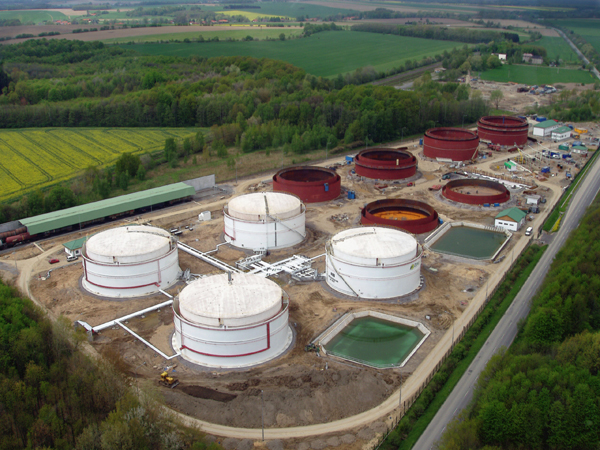International experience

Aleksandr Aleksandrovich Pupkov,
Technology and Quality Director, PARKNEFT, LLC
Based on the European experience, I connect my future with PARKNEFT
There are only a few entries in my work record. In 2001 I graduated the Faculty of “mechanics” of Vilnius Technical University n.a. Gediminas and was awarded a graduate diploma and began my career in International construction corporation (a unit of Specialized building trust No. 7, Moscow). Since 2004 I worked in the Czech company OKZ HOLDING a.s., and then in PARKNEFT. It turns out that I'm an old-timer in PARKNEFT; I’ve been working here almost since the moment of the Company incorporation.
My Projects
Among the most interesting and important projects where our Company and I personally have participated I would point out several facilities constructed in different countries - the Netherlands, Lithuania, the Czech Republic, Belgium.
The Netherlands
-
Expansion of the terminal Vopak Terminal Europoort in Rotterdam for the world's largest independent supplier of tanks for storage of oil and chemical products Vopak. Construction of four fuel oil tanks with the capacity of 40,000 m3 with an internal heating system, mixing by air and piping.
-
Expansion of the terminal Euro Tank Terminal B.V. in the port of Rotterdam, construction of six tanks with a capacity of 40,000 m3 with piping.
-
Expansion of the terminal for chemical products Oiltanking Terneuzen B.V., construction of 16 tanks with a protective wall: two with the capacity of 40,000 m3, seven with the capacity of 25,000 m3, five of 10,000 m3 and two of 6,000 m3 completely piped.
Lithuania
-
Repair of pipelines for finished product - a gas pipe line on Mazeikiai refinery.
-
Expansion of marine oil terminal in the town of Butinge for Mazeikiai refinery. Construction of two tanks with the nominal capacity of 56,000 m3 - including pump piping and process piping to ensure operation of the terminal (at that time the plant was owned by Williams International Company, USA). The whole scope of work was performed under the supervision and control of American and Danish experts.
-
Construction of the boiler for the needs of the inhabitants of the town of Visaginas and Ignalina Nuclear Power Plant. Polish -French company SNC-Lavalin Megadex Sp. z o.o was the holder of the contract for these works.
-
Construction of a isothermal tank for ammonia, the capacity of 15,000 metric tons, for JSC Ahem, which is the largest producer of nitrogen fertilizers and other chemical products in the Baltic. The project was developed and the quality control was carried out by German corporation ThyssenKrupp Uhde GmbH.
I also participated in other objects on construction of and engineering support for tanks and building structures for oil and chemical purposes in the Czech Republic and Belgium. Among them there are facilities for ČESKÁ RAFINÉRSKÁ, a.s., Chemoprojekt, as, Vesta Terminal Flushing, Mercuria Terminals Flushing, a terminal in the Belgian city of Ghent and many others.
Thus we entered the Russian market having obtained international experience.
Different approaches
In terms of experience I can say that the level of training of foreign professionals working at various facilities of the Fuel and Energy Sector in different European countries is higher than in Russia. Projects are also much better prepared. It is important to note that in the Old World in most cases the project documentation is developed in the holding company which is engaged in construction itself. Therefore, there are practically no deviations from the prepared drawings and engineering schemes when implementing the project and the decisions on such deviations are made much faster. As they say, theory is supported by practice. In Russia they often work “on the fly” – if it is required the project may be significantly modified at your risk.
“Yesterday”
In the course of project implementation in European countries more time is given directly for the construction work. Whereas asking about the date of completion in Russia one can hear “it had to be done yesterday” as an answer. After that, on-site work is performed in “an emergency” mode and the project is modified anew. This approach implies additional human resources and technology. In Europe, it is more common to focus on performance and maximum depreciation of equipment.
All together
Both in Russia and in Europe foreign manpower is attracted into construction.
However, in the countries of the continent projects engage not those whom they managed to find and who are willing to go and to start construction work in the conditions not at all comfortable, but highly specialized experts. And foreign workers in these countries are paid not for being present at construction sites but for the amount of work done.
Portfolio
As for wages, in Holland it is generally higher for all categories of workers in our industry. But with higher taxes, the difference is almost eliminated.
If we compare the level of training of higher and middle ranking technical specialist, then it is initially higher in case of our foreign colleagues, who year after year monotonically add new objects to their “portfolio”. There is a task - they complete it with high quality and on time, each in their own field.
Associates and plans
Despite the difference in approach to work, I particularly like constructing objects of Fuel and Energy Sector in Russia. Today my European practical expertise allows me to establish relationships with the team, with individual specialists, taking into account the existing realities of the construction market.
It has always been a tough task to implement best practices. Step by step, with the support of the Company's management, we are changing the way we work. It is encouraging that there are a growing number of like-minded fellows in the team. It means that a lot of important and interesting projects waiting for our Company ahead. Naturally, it is PARKNEFT that I connect my future with.


